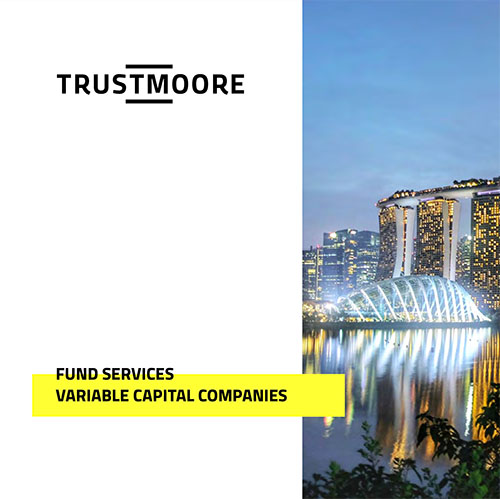

The Variable Capital Company (VCC) is an enhanced form of the Singapore incorporated company, which is specifically tailored for the asset management industry and used for collective investment schemes (CIS).
The VCC Act was launched on 14 January 2020 with an initial pilot of 18 licensed fund managers.
It immediately enjoyed strong momentum, with more than 400 VCCs and 550 sub-funds registered in the first two years.
Singapore currently offers a variety of structures for investment funds including limited partnerships, unit trusts, business trusts, and real estate investment trusts. Corporations are also commonly used as investment subsidiaries for fund investments; more than 70% of alternative funds sold in Singapore are corporate form funds that are domiciled in foreign locations. However, there are limitations to each fund structure, including investor transparency issues, restrictions on dividend payout from capital, and lack of access to certain tax treaties that Singapore has in place. That is what makes the VCC an attractive and efficient investment fund structure option.
The following key features attract the fund industry to VCCs:
- Segregation of sub-funds mitigates risk – a VCC can be established as a standalone fund, or as an umbrella fund with multiple sub-funds. In case of insolvency, each sub-fund must be wound up separately. Ring-fencing the assets and liabilities of each sub-fund in this way helps to safeguard investors.
- Flexibility with dividend payouts – a VCC can pay dividends from capital, which is not typically permissible in other corporate forms.
- Heightened privacy – this is an essential feature for private funds because the constitution, financial statements and the Register of Members (investors) cannot be made public.
- Tax incentives – incentives are extended to both the VCC and the Singapore fund manager. Funds can apply for section 13R (Onshore Fund Tax Exemption Scheme), 13X (Enhanced Tier Fund Tax Exemption Scheme) and a tax exemption for venture capital funds (Section 13H scheme). Fund managers of VCC funds may apply for the Financial Sector Incentive Scheme for fund management (FSI-FM) and Fund Management Incentive (FMI) Scheme, which provides concessionary tax rates of 10% and 5%.
- Flexibility of use - the VCC structure can be used for both open-ended and close-ended fund types.
- Re-domiciliation of foreign funds - foreign funds structured similarly to the VCC can re-domicile to Singapore via a simple registration process under the Companies Act. This allows foreign funds to preserve their corporate history and identity while capitalizing on the benefits that the VCC has to offer.
- Cost efficiencies from economies of scale - the umbrella VCC structure allows sub-funds to share a common fund manager, investment team, board of directors, service providers (i.e. fund administrator, counsel, custodian, auditor) hence reducing statutory and regulatory reporting requirements, as well as ongoing operational expenses.
A VCC must fulfil some regulatory obligations with regards to its function and operations, which include the following:
- The VCC must appoint a fund management company (FMC) that is licensed or registered by the Monetary Authority of Singapore (MAS) or is an exempt financial institution in Singapore.
- The VCC must fulfil the minimum requirements for Singapore, such as maintaining a Singapore-registered office address and having at least one director who is ordinarily a resident in Singapore.
- At least one director of the VCC must be a director or a qualified representative of the VCC fund manager (who may or may not be a resident of Singapore).
- The VCC must comply with Anti-Money Laundering/Countering the Financing of Terrorism (AML/CFT) procedures, as required by MAS.
- If a fund is offered to certain types of investors (retail investors for example), a custodian of assets is required.
The VCC has captured interest from almost all types of fund managers in the industry. The efficient and easy-to-adopt structure has been cited by fund managers with both traditional and alternative strategies - as well as for open-ended (mutual and hedge funds) and closed-ended funds (venture and private equity) - as a clear advantage.
Common applications of VCCs include Master Feeder, managed accounts and wealth management pooling.
Looking more closely at the profile of VCC adopters, we see a diverse group of fund managers, ranging from boutique-sized managers to globally known institutions, from startup managers to managers of multi-billion-dollar funds, and from local to international fund managers.
Family offices have also expressed a keen interest in the VCC. Factors cited include co-location, easy demonstration of substance, economies of scale, operational efficiencies, and ease of setting up sub-funds to separate assets and liabilities.
We believe the diversity seen among early adopters is a positive sign for the future growth potential of the industry.
The VCC grant scheme, launched by the Monetary Authority of Singapore (MAS) under Singapore’s Financial Sector Development Fund, currently offers a grant of up to 30% of eligible expenses paid to Singapore based service providers.
Introduced to encourage the adoption of the VCC vehicle, it aimed to help fund managers defray VCC-related set-up costs (including legal, tax advisory, fund administration and regulatory compliance services). The grant is capped at $30,000 per application and limited to one VCC per qualifying fund manager. It also covers existing offshore investment funds that redomicile in Singapore.
The grant supports diversity in the industry, particularly in not precluding boutique-sized investment managers from participating in the VCC regime.
The big picture:
- The Variable Capital Companies Grant Scheme (VCCGS) has been extended for two years.
- The Financial Sector Development Fund (FSDF) will co-fund 30% of qualifying expenses up to a maximum of S$30,000 per application.
- The VCC must be incorporated or redomiciled before 15 January 2025.
As well as assisting and advising you on the process of incorporating a VCC in Singapore, we can assess the eligibility of your fund to apply for these grants.
This grant supports diversity in the industry, particularly in not precluding boutique-sized investment managers from participating in the VCC regime.
As well as assisting and advising you on the process of incorporating a VCC in Singapore, we can assess the eligibility of your fund to apply for these grants.
While the introduction of the VCC has certainly had a powerful impact, there are some limitations to the current regime. A VCC must be managed by a Singapore-licensed fund manager, thereby eliminating two prominent groups in asset management, i.e. the fund managers for real estate assets/real estate investment trusts (REITs) and single-family offices, both of which fall under the “exempt manager” classification. As one of the central tenets of the VCC is its flexibility of use for multiple strategies, both the real estate and private wealth groups would benefit from the VCC model if the scope of permissible fund managers is widened.
There are a handful of existing investment fund vehicles using onshore structures other than the VCC, such as the Singapore Limited Partnership or a Singapore Private Company Limited. To encourage them to convert to a VCC structure, perhaps a tax incentive (a stamp duty waiver, for example) will be introduced to facilitate conversion.
Additionally, it will be interesting to note any accounting valuation, audit and tax questions that could arise during the first tax season of VCCs next year. The Inland Revenue Authority of Singapore (IRAS), Accounting Corporate Regulatory Authority (ACRA) and MAS might find it useful to engage with industry experts to ensure consistent interpretation of VCC-related provisions.
Before the VCC act, offshore investment vehicles (such as those in the Cayman Islands, Delaware and Mauritius) were predominantly incorporated and domiciled in jurisdictions that allow for greater flexibility in capital, shares issuance and taxation. Given investor familiarity with these locations, they were popular even for Singapore-based investment managers, despite Singapore’s obvious advantages - a sophisticated financial center with a stable political landscape, progressive economic policies, and a robust education system.
The establishment of the VCC framework mirrors the more well-known and established offshore fund structures (such as the Cayman Segregated Portfolio Company and Luxembourg SICAV) in several areas, including legal framework, governance, requirements of the fund manager, reports, registers, and taxation. These similarities increase investor comfort and, therefore, adoption of the VCC.
Noted for its balanced yet forward-thinking approach, the MAS is keen to ensure that Singapore stays ahead in the asset management game by embarking on the VCC 2.0 project.
Expected enhancements to the VCC include:
a) extending the regime to single-family offices and specific classes of exempt managers, negating the need for licensing for this group of managers.
b) extending fund passporting schemes.
c) taking further steps to promote collaboration opportunities in the ecosystem of fund service providers.
d) issuance of industry guidelines and sound practices.
Following the introduction of the VCC regime, we have already seen strong uptake from new fund managers and industry professionals in Singapore. This has resulted in a more robust fund management ecosystem, paving the way for Singapore to achieve its goal to be the global hub for asset managers.
If the above enhancements go ahead, it will constitute a quantum leap in improving Singapore’s value proposition as an international and independent fund domiciliation hub.
We are a management-owned fund administrator and corporate services provider with a global presence. We can help with the incorporation of your VCC and provide full fund administration services.
As a fund administrator, we are responsible for the independent valuation of the fund, including the calculation of the net asset value (NAV), subscription and redemption prices, as well as remuneration to the fund manager via management and performance fees. Typically, we also take on the role of a transfer agent. Key functions include maintaining a record of ownership of fund interests, processing the subscriptions and redemptions of the fund, distributing dividends among other corporate actions, and preparing capital account statements.
We have a distinctive culture and approach, based on being:
- a boutique-style player: our clients come first, and we offer services tailored to each client’s needs.
- an industry challenger: in a conservative industry, we are honest about who we are, and we tell it like it is.
- a long-term partner: we build lasting relationships, delivering high-quality corporate services with a human touch.




